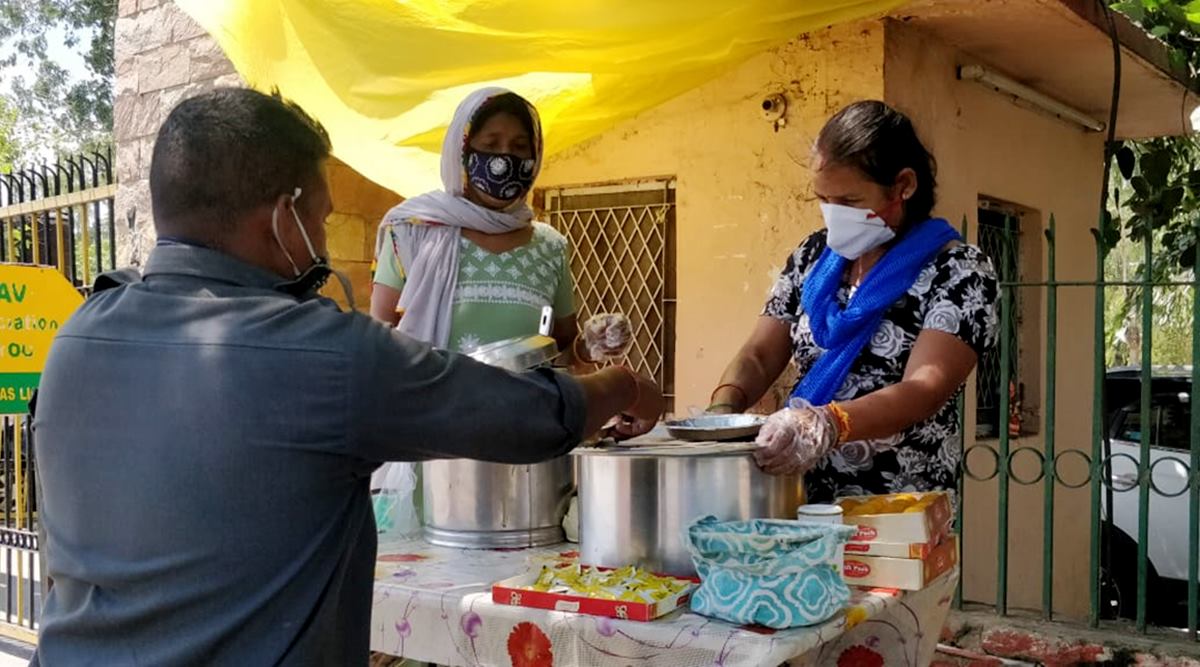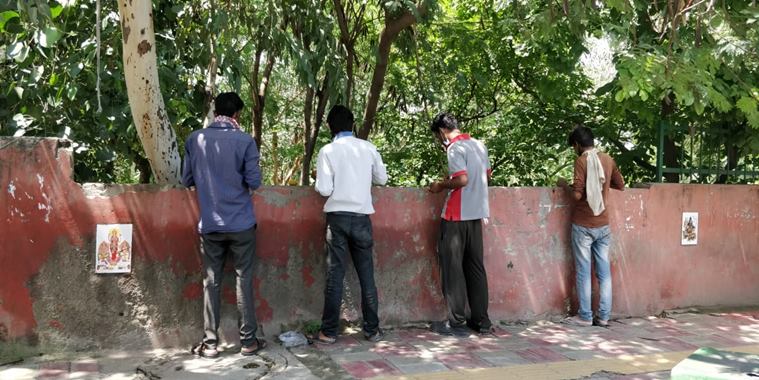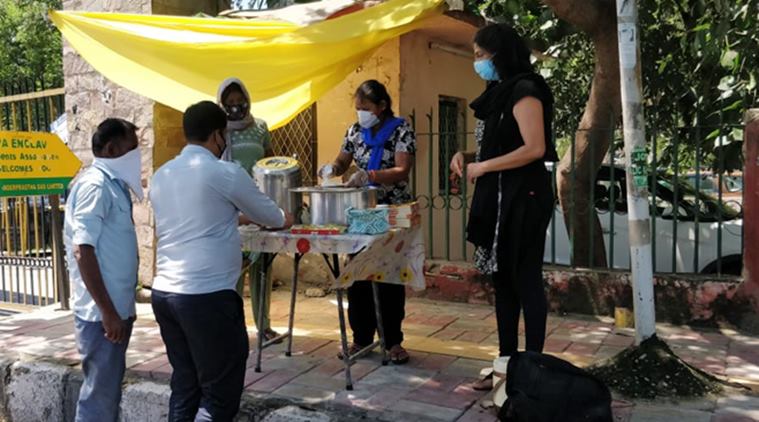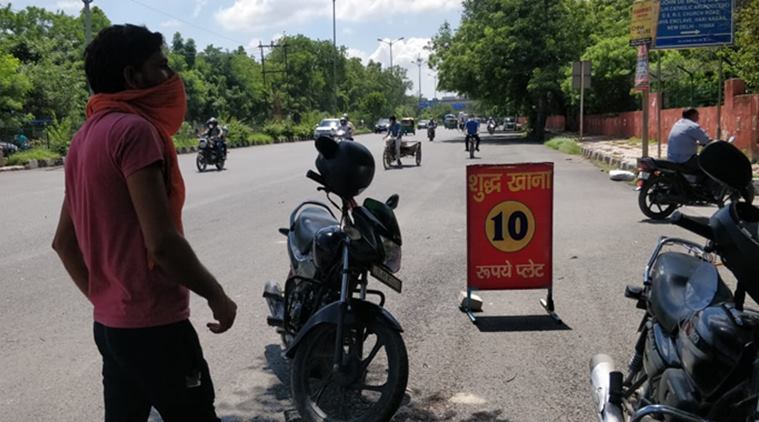 One of the key facets of the initiative is that the food is prepared by an all-women team hailing from underprivileged backgrounds.
One of the key facets of the initiative is that the food is prepared by an all-women team hailing from underprivileged backgrounds.“It’s like eating ghar ka khana,” says Akhbar Ali while sanitizing his hand after devouring a plate of rice, daal and sabzi, all for a token price of Rs 10. The 28-year-old plumber is among the many labourers and factory workers who regularly throng a food stall for their lunch at a corner of a road in Mayapuri, home to Asia’s largest scrap market.
A combined initiative by two NGOs — Hamari Udaan and Action For Community Development Trust (ACT) — ‘Food with Dignity’ (FWD) programme aims to ensure that a person is accorded the full dignity of a paying customer and not giving away food for free.
“A lot of people wanted us to give free food. However, I was insistent to not do so because free food is seldom respected,” Hamari Udaan founder Sanjay Dodrajka told the indianexpress.com. What started off as a casual conversation soon transformed into a full-fledged venture by November 2018. “I always wanted to do something around food. When I came across videos of ‘Dadi ki Rasoi’. It really inspired me,” Dodrajka said.
 “Anyone who comes to the stall is requested to stand at a distance and people without masks are not served food,” Dodrajka says. (Express photo by Avantika Chopra)
“Anyone who comes to the stall is requested to stand at a distance and people without masks are not served food,” Dodrajka says. (Express photo by Avantika Chopra)
One of the key facets of the initiative is that the food is prepared by an all-women team hailing from underprivileged backgrounds.
Seema Taneja, a volunteer of ACT, which works towards the upliftment of women from the underprivileged sector, has been associated with the initiative since its inception. “We started cooking at our homes to see how much food can be made and when the trials were successful, we trained the women and opened a kitchen in Sagarpur,” she said.
Explaining the work in the kitchen, Taneja said, “There are a total of 10 ladies who work in weekly shifts. At a time, 5 work together with three cooking the food and two manning the stall.”
 With the success of their initiative, donations and sponsorship have been pouring in. However, FWD discourages in-kind donations in order to maintain food quality. (Express photo by Avantika Chopra)
With the success of their initiative, donations and sponsorship have been pouring in. However, FWD discourages in-kind donations in order to maintain food quality. (Express photo by Avantika Chopra)
Among those who cook the food is Raza Azizul along with her two daughters — Farah and Tabassum. For the mother-daughter team, their day in the kitchen begins at 9 am and concludes by noon. “From rajma, pulses to biryani and halwa, we make everything,” says Azizul. Once the food is prepared, it is handed over and dispatched with another group of women.
Fatima, who has been associated with the venture since the past one-and-a-half years, serves the food. “One thing you will notice here is that no one wastes food,” she says. “People really relish the food we serve.”
However, the stall noted a decline in customers since the Covid-19 outbreak. “Before the pandemic struck, we were going up to 200-250+ plates. Post pandemic, as we have recently started again, we are getting a footfall of over 80-90 people per day,” Dodrajka said.
 Post-Covid, free sanitizer pouches and bottles are also provided at the stall.
Post-Covid, free sanitizer pouches and bottles are also provided at the stall.
From wearing masks and gloves to sanitising their hands while serving, the FWD team is following all the Covid-19 safety measures. “Anyone who comes to the stall is requested to stand at a distance and people without masks are not served food,” Dodrajka says. Free sanitizer pouches are also provided.
Explaining how charging for the food, albeit a token amount, instils pride in the customers, Dodrajka says, “Because they are paying for the food, they feel that they have the right to give feedback. If there is an issue with the food, they come and tell us and we appreciate their response.” While the rates are subsidised to Rs 10, the NGO spends Rs 20-22 on each plate.
 What started off as a casual conversation soon transformed into a full-fledged venture by November 2018. (Express photo by Avantika Chopra)
What started off as a casual conversation soon transformed into a full-fledged venture by November 2018. (Express photo by Avantika Chopra)
Dilip Kumar Shah, a 38-year-old electrician, says that he stopped bringing food from home after he started eating at the stall. “The food here is really good. On some days, we even get fruits and ice cream,” he adds.
With the success of their initiative, donations and sponsorship have been pouring in. However, FWD discourages in-kind donations in order to maintain food quality.
“We have had instances where people donated poor quality rice or pulse. We had to throw it. We can’t compromise on the quality of food as that is what people come for,” says Dodrajka. Encouraged by the positive response, Dodrajka plans to expand this venture. “I can supply the food but all that is needed is manpower to manage the stalls.”